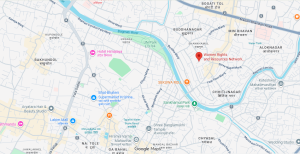This event aimed to address intergenerational challenges in forest management, particularly focusing on the inclusion of youth and women’s perspectives. The presentation by Mr. Yadav commenced with an overview of Sustainable Forest Management (SFM), Agroforestry, Eco-tourism, and the Conservation and Utilization of Forests. Dr. Yadav started the program with a huge appreciation for setting out an example by Piple Pokhara CFUG enterprise group for becoming very famous not only in Hetauda but also nationally for the products that have been producing by the women led enterprise group from degraded timbers of their CF. He added that the proper utilization of the degraded timber by using it for producing photo frames and theki and other gift materials seem to be really impressive.
Dr. Yadav opened the discussion with a presentation on Sustainable Forest Management (SFM), highlighting its multifaceted nature that encompasses biodiversity conservation, economic sustainability, and social governance. He emphasized that integrating the viewpoints of youth and women is essential for developing effective forest management strategies. This inclusive approach not only empowers marginalized groups but also enhances decision-making processes within the CFUGs. He also discussed agroforestry as a means to improve biodiversity while providing varied income sources for local communities. He underscored the significance of silviculture in maintaining forest health, which is crucial for achieving Nepal’s goal of sustainable forest management by 2025.
A pivotal part of the dialogue centered on eco-tourism as a viable strategy for sustainable development. Dr. Yadav noted that eco-tourism can generate revenue for local communities while promoting conservation efforts.
Engaging youth and women in varied products of wooden handicraft not only creates job opportunities but also creates a positive message of social and cultural belief as well that women also can be engaged in works for their own sake.
The development of Operational Plans (OPs) for CFUGs was another critical topic addressed during the session. These plans outline silvicultural operations, harvesting schedules, and benefit-sharing mechanisms essential for effective forest management. Dr. Yadav reiterated the importance of active participation from all user group members to ensure that OPs meet local needs and align with broader management strategies.
The session at the final stage was about open discussion session where participants were provided platform for speaking up about the issues faced by women and youths in regular functioning of the CFUG activities and decision-making process. The overall participants were seem to be afraid of taking part in CFUG program with varied reasons such as time management due to household chores, fear of speaking up in the public and lack of hearing of the decisions made by women and youth.
At last, Dr. Yadav reinforced the importance of ongoing dialogue among government entities, civil society organizations, and local communities. He advocated for partnerships that respect diverse perspectives to enhance Nepal’s forestry sector’s sustainability and resilience—benefiting both current and future generations.





